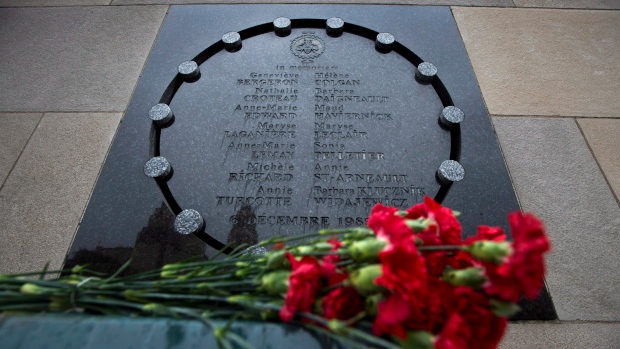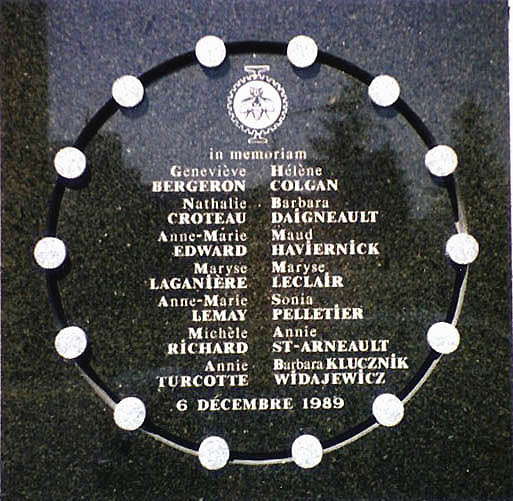The École Polytechnique massacre was a horrific crime. It was also the brutal, explicit assertion of an ideology that is usually hidden. Marc Lépine said he was “fighting feminism.” He said he wanted to stop women from “seizing [the advantages] accorded to men.” He said they had ruined his life.
 Fast-forward 25 years after December 6, 1989. This year, Canadian-American feministAnita Sarkeesian had tocancel a scheduled talk at Utah State University after university staff received anonymous emails promising a “Montreal Massacre style” mass shooting if the event proceeded as planned. Sarkeesian documents and critiques sexist and stereo-typical depictions of women in video games. This year was also the year Elliot Rodger in Santa Barbara, California, killed six people in what he described as a “day of retribution” for years of supposed rejection by women.
Fast-forward 25 years after December 6, 1989. This year, Canadian-American feministAnita Sarkeesian had tocancel a scheduled talk at Utah State University after university staff received anonymous emails promising a “Montreal Massacre style” mass shooting if the event proceeded as planned. Sarkeesian documents and critiques sexist and stereo-typical depictions of women in video games. This year was also the year Elliot Rodger in Santa Barbara, California, killed six people in what he described as a “day of retribution” for years of supposed rejection by women.
It cannot be denied that the root cause of male violence against women in these cases is misogyny. Marc Lepine and Elliot Roger’s misogyny is incontestable. In our society, there is still sexism, from disrespectful attitudes and discriminatory practices, through to the high levels of male violence against women. Lepine and Rogers are both extreme but logical products of a culture that enables and validates the feelings of angry, lonely and sometimes mentally unwell men. Both serial murders were predetermined, women-targeted, and public. Both massacres were followed by conversations by mainstream media ignoring the inherent sexist nature of these crimes. These tragedies were both committed by men who felt a sense of entitlement. They punished women for pursuing their will to exercise their rights to education and to control their bodies.
[quote align=”center” color=”#999999″] These attacks were carried out by men who were politically motivated by their hatred for women who are not confined by patriarchal gendered roles.[/quote]
In both cases, the media and the psychological community have attempted to label these men as disturbed individuals suffering from mental illness. Though Marc Lépine and Elliot Rodger may have been mentally ill, these attacks carried out by men, were politically motivated by their hatred for women who are not confined by patriarchal gendered roles.
Jessica Valentini explains, “The truth is that there is no such thing as a lone misogynist — they are created by our culture, and by communities that tells them that their hatred is both commonplace and justified.”
If you are one of those young men and women who deny themselves as a feminist, I encourage you open your eyes to the reality that existed 25 years ago and continues to exist today. We have all grown complacent to a certain extent. Let’s not be afraid to hold up a mirror to our culture. Let’s look closely at the kinds of attitudes we are perpetuating, even if they make us uncomfortable to the core. The best way to remember these fourteen women is to recommit ourselves, women and men, to recognize patterns in our society that perpetuate sexist practices and continue to fight for women’s liberation and to bring an end to violence against women.
Every December 6, we remember:
[quote align=”center” color=”#999999″]Geneviève Bergeron, 21; Hélene Colgan, 23; Nathalie Croteau, 23; Barbara Daigneault, 22; Anne-Marie Edward, 21; Maud Haviernick, 29; Barbara Maria Klueznick, 31; Maryse Leclair, 23; Annie St.-Arneault, 23; Michèle Richard, 21; Maryse Langaniere, 25; Anne-Marie Lemay, 22; Sonia Pelletier, 28; and Annie Turcotte, 21.[/quote]
There’s a candlelight vigil Saturday at 6 p.m. on the University of Toronto’s Philosopher’s Walk. Bring a candle and a rose. For more information, see www.womenwontforget.org.
Tazrian Alam





